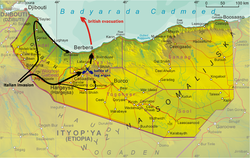| Italian invasion of British Somaliland | |||||||||
|---|---|---|---|---|---|---|---|---|---|
| Part of the East African campaign of the Second World War | |||||||||
 Italian conquest of British Somaliland, August 1940 | |||||||||
| |||||||||
| Belligerents | |||||||||
| |||||||||
| Commanders and leaders | |||||||||
| Strength | |||||||||
|
4,507 British and Commonwealth troops (75 per cent King's African Rifles and Somali irregulars) | 24,000 Italian and colonial troops | ||||||||
| Casualties and losses | |||||||||
|
Total: 2,275 British Empire: 50 killed 105 wounded 120 missing Somali (British service) c. 2,000 7 aircraft destroyed 10 aircraft damaged 1 tug lost 2 vessels damaged |
Total: 3,029
c. 1,000 4 aircraft destroyed | ||||||||
The Italian invasion of British Somaliland (3–19 August 1940) was part of the East African campaign (1940–1941) in which Italian, Eritrean and Somali forces of Fascist Italy entered the Somaliland Protectorate and defeated its garrison of British, Commonwealth and colonial forces supported by Somali irregulars. The Italian victory was based on mobility and speed but was hampered by the terrain, rainy weather and British resistance.
At the Battle of Tug Argan (11–15 August) Italian attacks had the advantage of artillery and the outnumbered defenders were gradually worn down and slowly outflanked, until the remaining fortified hilltops were vulnerable to capture. After the failure of a counter-attack towards the Mirgo Pass, the local commander, Major-General Reade Godwin-Austen, had too few men to retrieve the situation and to keep open an escape route at the same time and was given permission to retreat towards Berbera.
The British fought a rearguard action at Barkasan on 17 August and retreated after dark. The improvised evacuation went better than expected and the second blocking position at Nasiyeh was not needed. The rainy weather continued to slow the Italian advance and when the airstrip near Berbera was found still to be garrisoned, a prospective Italian coup de main was cancelled. The British defeat was controversial and the beginning of a deterioration in relations between General Archibald Wavell, the theatre commander, his subordinates and Prime Minister Winston Churchill, which ended in Wavell being superseded by Claude Auchinleck in July 1941.
Cite error: There are <ref group=lower-alpha> tags or {{efn}} templates on this page, but the references will not show without a {{reflist|group=lower-alpha}} template or {{notelist}} template (see the help page).